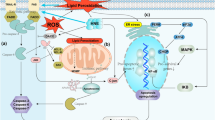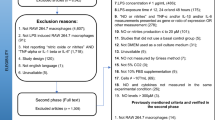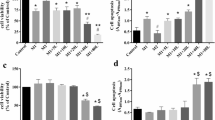Abstract
Objective
To investigate the effects of emodin on inflammation and autophagy in lipopolysaccharide (LPS)-induced RAW 264.7 macrophages and reveal its underlying mechanism.
Methods
3-(4,5-dimethylthiazol-2-yl)-5-(3-carboxymethoxyphenyl)-2-(4-sulfophenyl)-2H-tetrazolium (MTS) assay was conducted to find the appropriate dose for emodin. RAW264.7 cells pretreated with different concentrations (0–50 μmol/L) of emodin or vehicle for 2 h prior to exposure to LPS for 16 h. Cell morphology was examined and propidium iodide staining was used to examine cell cycle. Expressions of inflammation-related proteins [nuclear factor-kappaB (NF-κ B) and I-kappaB (I κ B)α] and autophagy-related proteins [light chain (LC)3, P62/sequestosome 1, mammalian target of rapamycin (mTOR), and p-mTOR] were examined using Western blot analysis. Expression of inflammation-related cytokines including tumor necrosis factor (TNF)-α, interleukin (IL)-1β and IL-6 were detected by enzyme-linked immunosorbent assay. Autophagy was examined with LC3B fluorescence intensity and aggregation. The effect of emodin on autophagy was conducted with an autophagy inhibitor, 3-methyladenine (3-MA).
Results
The expression of NF-κ B in LPS-induced cells was significantly increased (P<0.01) and simultaneously I κ B α decreased compared with the normal cell (P<0.05). The expressions of TNF-α, IL-β, and IL-6 proteins in the LPS-induced RAW264.7 cells were significantly higher than in the normal cell (P<0.05 or P<0.01). LPS increased the percentage of cells in the G0/G1 phase, which was recovered by emodin at different doses (12.5, 25, and 50μ mol/L, P<0.05 or P<0.01). The medium-dose (25 μ ml/L) emodin decreased the expressions of NF-κ B, P62 and p-mTOR (P<0.01) and increased I κ B α expression, LC3B II/I ratio as well as LC3B fluorescence intensity (P<0.05 or P<0.01). Meanwhile, the enhanced autophagic effects of emodin, such as the increment of LC3B II/ratio and the decrement of P62 expression, were suppressed by autophagy inhibitor 3-MA.
Conclusion
Emodin could inhibit inflammation of mice RAW264.7 macrophages induced by LPS, possibly through activating autophagy.
Similar content being viewed by others
References
Herridge MS, Angus DC. Acute lung injury—affecting many lives. N Engl J Med 2005;353:1736–1738.
Granja T, Kohler D, Mirakaj V, Nelson E, Konig K, Rosenberger P. Crucial role of Plexin C1 for pulmonary inflammation and survival during lung injury. Mucosal Immunol 2014;7:879–891.
Ruan SY, Lin HH, Huang CT, Kuo PH, Wu HD, Yu CJ. Exploring the heterogeneity of effects of corticosteroids on acute respiratory distress syndrome: a systematic review and meta-analysis. Crit Care 2014;18:R63.
Chen YB, Liu Q, Xie H, Yin SM, Wu L, Yu XH, et al. Is Chinese medicine injection applicable for treating acute lung injury and acute respiratory distress syndrome? A systematic review and meta-analysis of randomized controlled trials. Chin J Integr Med 2019;https://doi.org/10.1007/s11655-019-3078-7.
Dong X, Fu J, Yin X, Cao S, Li X, Lin L, et al. Emodin: a review of its pharmacology, toxicity and pharmacokinetics. Phytother Res 2016;30:1207–1218.
Gao J, Wang F, Wang W, Su Z, Guo C, Cao S. Emodin suppresses hyperglycemia-induced proliferation and fibronectin expression in mesangial cells via inhibiting cFLIP. PLoS One 2014;9:e93588.
Zhang W, Lu X, Wang W, Ding Z, Fu Y, Zhou X, et al. Inhibitory effects of emodin, thymol, and astragalin on leptospira interrogans-induced inflammatory response in the uterine and endometrium epithelial cells of mice. Inflammation 2017;40:666–675.
Meng G, Liu Y, Lou C, Yang H. Emodin suppresses lipopolysaccharide-induced pro-inflammatory responses and NF-kappaB activation by disrupting lipid rafts in CD14-negative endothelial cells. Br J Pharmacol 2010;161:1628–1644.
Xiao M, Zhu T, Zhang W, Wang T, Shen YC, Wan QF, et al. Emodin ameliorates LPS-induced acute lung injury, involving the inactivation of NF-kappaB in mice. Int J Mol Sci 2014;15:19355–19368.
Jones SA, Mills KH, Harris J. Autophagy and inflammatory diseases. Immunol Cell Biol 2013;91:250–258.
Tal MC, Sasai M, Lee HK, Yordy B, Shadel GS, Iwasaki A. Absence of autophagy results in reactive oxygen species-dependent amplification of RLR signaling. Proc Natl Acad Sci USA 2009;106:2770–2775.
Nakahira K, Haspel JA, Rathinam VA, Lee SJ, Dolinay T, Lam HC, et al. Autophagy proteins regulate innate immune responses by inhibiting the release of mitochondrial DNA mediated by the NALP3 inflammasome. Nat Immunol 2011;12:222–230.
Zhou R, Yazdi AS, Menu P, Tschopp J. A role for mitochondria in NLRP3 inflammasome activation. Nature 2011;469:221–225.
Russotto V, Bellani G, Foti G. Respiratory mechanics in patients with acute respiratory distress syndrome. Ann Transl Med 2018;6:382.
Joh EH, Gu W, Kim DH. Echinocystic acid ameliorates lung inflammation in mice and alveolar macrophages by inhibiting the binding of LPS to TLR4 in NF-kappaB and MAPK pathways. Biochem Pharmacol 2012;84:331–340.
Looney MR, Roubinian N, Gajic O, Gropper MA, Hubmayr RD, Lowell CA, et al. Transfusion-Related Acute Lung Injury Study Group. Prospective study on the clinical course and outcomes in transfusion-related acute lung injury. Crit Care Med 2014;42:1676–1687.
Fan E, Brodie D, Slutsky AS. Acute respiratory distress syndrome: advances in diagnosis and treatment. JAMA 2018;319:698–710.
Maruyama Y, Sou YS, Kageyama S, Takahashi T, Ueno T, Tanaka K, et al. LC3B is indispensable for selective autophagy of p62 but not basal autophagy. Biochem Biophys Res Commun 2014;446:309–315.
Mizushima N. Autophagy: process and function. Genes Dev 2007;21:2861–2873.
Niklaus M, Adams O, Berezowska S, Zlobec I, Graber F, Slotta-Huspenina J, et al. Expression analysis of LC3B and p62 indicates intact activated autophagy is associated with an unfavorable prognosis in colon cancer. Oncotarget 2017;8:54604–54615.
Fujishima Y, Nishiumi S, Masuda A, Inoue J, Nguyen NM, Irino Y, et al. Autophagy in the intestinal epithelium reduces endotoxin-induced inflammatory responses by inhibiting NFkappaB activation. Arch Biochem Biophys 2011;506:223–235.
Yen YT, Yang HR, Lo HC, Hsieh YC, Tsai SC, Hong CW, et al. Enhancing autophagy with activated protein C and rapamycin protects against sepsis-induced acute lung injury. Surgery 2013;153:689–698.
Hussell T, Bell TJ. Alveolar macrophages: plasticity in a tissue-specific context. Nat Rev Immunol 2014;14:81–93.
Tian SL, Yang Y, Liu XL, Xu QB. Emodin attenuates bleomycin-induced pulmonary fibrosis via anti-inflammatory and anti-oxidative activities in rats. Med Sci Monit 2018;24:1–10.
Chen GL, Zhang JJ, Kao X, Wei LW, Liu ZY. Emodin ameliorates lipopolysaccharides-induced corneal inflammation in rats. Int J Ophthalmol 2015;8:665–669.
Author information
Authors and Affiliations
Contributions
TU YJ and Tan B contributed equally to this work. Yang AD was responsible for designing the experiments. Tu YJ and Tan B were responsible for analyzing the experimental data and writing the paper. Jiang L, Wu ZH, Yu HJ, Li XQ were responsible for experimental operation e.g., cell culture, MTS assay, Western blot analysis, ELISA and Immunofluorescence analysis. All authors read and approved the final manuscript.
Corresponding author
Ethics declarations
The authors declare no conflict of interests in this work.
Additional information
Supported by Ministry of Science and Technology of China (No. 2018YFC1704102) and the National Natural Science Foundation of China (Nos. 81673855 and 81904072)
Rights and permissions
About this article
Cite this article
Tu, Yj., Tan, B., Jiang, L. et al. Emodin Inhibits Lipopolysaccharide-Induced Inflammation by Activating Autophagy in RAW 264.7 Cells. Chin. J. Integr. Med. 27, 345–352 (2021). https://doi.org/10.1007/s11655-020-3477-9
Accepted:
Published:
Issue Date:
DOI: https://doi.org/10.1007/s11655-020-3477-9




